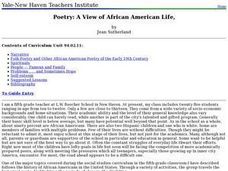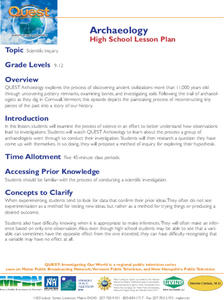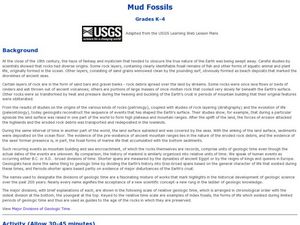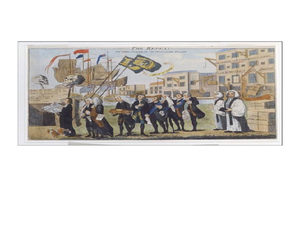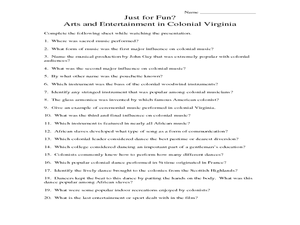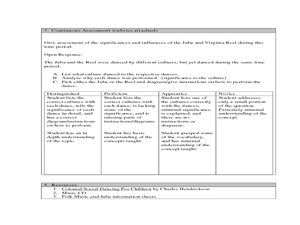Curated OER
Charleston Architectural Study
Student learn about the historical significance and local history of Charlestown SC. Students begin with lectures, notes, coloring books and culminate with historical building visits.
Curated OER
Major Events Leading to the American Revolution
Students explore the causes of the American Revolution. In this taxation without representation lesson, students analyze political cartoons in order to gain an understanding of the efforts of the colonists to resolve conflict with...
Curated OER
Poetry: A View of African American Life,
Fifth graders analyze many examples of African-American poetry and examine how different poems reflect the cultural experiences of African-Americans. The poems and spirituals chosen are very effective for public presentation.
Curated OER
Rites of Passage
Students, through video and Internet activities, are exposed to rites of passage in two modern day West African cultures, the Fulani and the Dogon, and how slavery served as a rite of passage for many West African people in the past.
Curated OER
Francophone Airline Information:Le Tour du Monde
Learners create a travel itinerary to Francophone countries by researching the web then present to the class.
Curated OER
Archaeology
Students examine how observations lead to investigations, and how archaeologists conduct their investigation.
Curated OER
Booker T. Washington and W. E. B. DuBois: The Problem of Negro Leadership
Students focus on the problem of African American leadership throughout American history. In groups, they research the life and works of Booker T. Washington and W.E.B. DuBois and how they worked to promote the need for African American...
Curated OER
Visit to Nature
Learners complete a science journal which contains pages in which they can predict what they think they will see before the field trip, and also pages to write down what they actually do see during the field trip.
Curated OER
Pieces of the Past
Students study the importance of preserving the archaeological record. They write a paragraph describing an object and why it is important to them. They cut their paper into a puzzle and compare their own to the student they trade with.
Curated OER
Decolonization and Self-Determination
Students define and discuss colonialism and self-determination. After reading the European's view on the topic, they analyze a map of imperialism in 1914. They watch excerpts of a video and take notes on various United Nations...
Curated OER
Model United Nations Activity
Students examine current and past problems and situations affecting the United Nations, and explore life, career, and philosophy of Ralph Bunche, American diplomat and Nobel Peace Prize winner. Students then prepare portfolios to...
Curated OER
Founding Myths, Stories that Hide Our Patriotic Past
Students participate in a scavenger hunt using their textbooks to find information about historical events, people and places in US history during the Revolutionary Era. After creating their list of important people, students create...
Curated OER
Poetry and Our National Anthem
Students express the meaning of the Star-Spangled Banner. In this American history instructional activity, students read through the national anthem and complete an activities from a list of choices. Some choices include: writing the...
Curated OER
Mud Fossils
Learners observe real fossils. In this science lesson, students make their own mud fossils by pressing material into the mud and letting it dry in the sun for 3-4 days. Learners then get the fossils out displaying their mud fossils.
Curated OER
The Art of Political Cartoons in Revolutionary America
Students analyze political cartoons. In this colonial America lesson, students examine the provided political cartoons and respond to analytical questions about each of them.
Curated OER
Dinosaur Detectives
Students write a report about a paleontologist. In this paleontology lesson, students research and write a report about a noted paleontologist. They discuss the importance of technology to paleontologists and how paleontologist excavate...
Curated OER
A Hoosier Perspective on the March to the Sea: The Diary of William Miller
Eighth graders take a closer look at Sherman's March to the Sea. In this American Civil War lesson, 8th graders analyze the diary entries of William Miller. Discussion questions are included with the entries. Students create illustrated...
Curated OER
Progress Amidst Prejudice: Portraits of African Americans in Missouri, 1880-1920
High schoolers explore and analyze a database of historical portraits of an African American family of the late 1800's. They trace the migration of one of the African Americans as he/she migrates toward urban areas.
Curated OER
Muses of Independence
Eighth graders explore the entertainment options in colonial America. In this colonial life lesson, 8th graders watch a movie about colonial music and arts. Students then respond to questions regarding the movie and also respond to 1...
Curated OER
Freedom Voices: Abolition and Suffrage in the United States
Students explore abolition and suffrage in the United States.
Curated OER
A House Divided: Photography in the Civil War
Students study Civil War photography and write captions for each picture based on context. In this Civil War photography instructional activity, students match photographs with their original captions. Students read included short...
Curated OER
Humanities in Colonial and Revolutionary America
Students demonstrate dances of colonial America. In this colonial American lesson, students learn forms of colonial social dancing including the Juba and Virginia Reel. Students examine the history of the 2 dances as well.
Curated OER
Patriots v. Loyalists
Students consider how colonial citizens chose sides in the American Revolution. In this Revolutionary War lesson, students role play Loyalists, Patriots, and undecideds in a classroom simulation. Students research their positions so that...
Curated OER
The Struggle for Women's Rights in the 1800's
Young scholars assist in preparing for debate as part of the group. They participate in the debate and the follow-up discussion, then write a letter expressing what they have learned and project their expectations for the future.




